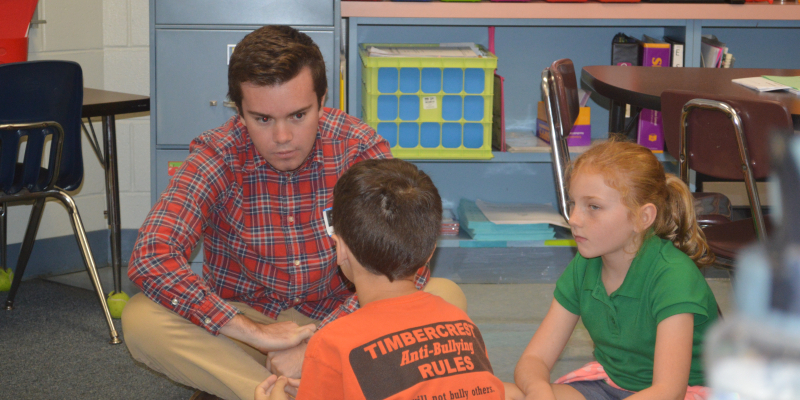
Nina B. Hollis Institute Services
The Nina B. Hollis Institute faculty have presented workshops throughout the United States and Europe on various topics and provides comprehensive program evaluations. The Nina B. Hollis Institute houses many multi-talented individuals that are capable of providing in-service workshops to schools and districts in several areas.
Area expertise includes:
- Certified Restorative Practices facilitators
- Restorative/Trauma Informed Coaching
- School climate and RP fidelity school analysis services
- Classroom Climate Management
- Differentiated Instruction
- The Neuroscience of Teaching
- Sum Math Support: Elementary Math Reasoning for Teaching
- Data Chats/PLC
What We Do
Restorative practices in schools are a way of handling conflicts and building positive relationships among students, teachers, and the school community. The goal of restorative practices is to create a supportive and caring school environment where conflicts are addressed in a way that promotes understanding, responsibility, and positive relationships. The Nina B Hollis Leadership Center has a cadre of certified trainers who provide training and education in the field of restorative practices. Stetson's RP training offers a range of training programs, workshops, and certifications to individuals and organizations interested in implementing restorative practices. The training typically covers various aspects of restorative practices, community building, conflict resolution, and leadership.
Restorative Trauma Informed Coaching
Trauma-informed care in education is an approach that recognizes the prevalence of trauma and seeks to create a safe and supportive environment for all students. By integrating trauma-informed care and restorative practices into education, schools aim to create an environment that promotes healing, resilience, and academic success for all students, taking into account the impact of trauma on their lives.
R/TIC is a unique model of incorporating restorative practices and trauma-informed care into one curriculum. Stetson trainers are certified in both Restorative Practice and Trauma-informed care and offer one, two and three-day training to schools and school districts.
Not sure about your schools climate? Let us conduct a school climate checkup. Our report provides valuable feedback as to what your next steps should be. Already trained your teachers in Restorative Practices? Not sure if it is being implemented with fidelity? Hire us to complete a RP fidelity check. It is one thing to train your teachers, it is another to make sure they are not just talking the talk, but also walking the walk.
Creating a Classroom Climate of Mutual Respect and Learning
Participants walk away with
practical, "best practice" strategies that are based on current research and easy to implement
How would you like to see...
- Your school to become a place of happy, successful learners?
- A smooth, orderly transition to all areas in each classroom and the school in general?
- Students resilient to life's stresses and becoming autonomous learners
- The school and class climate be one of safety, productivity, and excitement for learning?
- A safe and orderly classroom
Participants of this workshop walk away with hundreds of practical, research-derived classroom climates and behavioral strategies that make classrooms productive.
Outcomes:
- reduction of minor disruptions in the class,
- increase in student on-task behavior,
- drastic reduction in office referrals,
- stronger relationships between staff and students.
Demonstrations and hands-on practice sessions are interwoven with humor and real-life stories and provide a practical and creative professional development opportunity.
Our workshop can include:
- Dealing with the root causes of misbehavior in common classroom situations
- Student Buy-In
- Recognizing and addressing trauma and stress
- Creating resilience in children that fosters student success
- Schoolwide Management Plan
- Developing an Administrative support team
- Redirecting Student's Misbehavior and restoring group trust
- Crisis Intervention
Differentiated teaching is an instructional approach that acknowledges and accommodates the diverse learning needs, interests, and readiness levels of students within a single classroom. The goal is to ensure that all students, regardless of their background or learning style, have opportunities to learn and succeed. We provide support in the areas of student learning profiles, flexible grouping, varying learning material, high and low-tech formative assessment and developing student choice menus.
The neuroscience of learning
The Hollis Institute of Educational Reform has been researching different aspects of brain-based learning for several decades. We pioneered one of the first public single-gendered classrooms in the United States and studied the effects of gender-informed teaching practices, supported research in the area of exercise and academic focus, and worked with districts developing social-emotional supports for students. Our board is comprised of curriculum and behavior specialists, neuro-scientists who specialize in memory, and therapists who have developed programs in brain-based therapeutic practices.
Our team has worked with dozens of schools, districts and individual faculty regarding best practices in neuro-informed teaching. We offer one and two-day workshops that focus on brain-based learning such as gender differences in learning styles, incorporating movement into a standards-based curriculum, and creating a trauma-informed classroom/school.
Can you remember a time when you didn't know what 4 meant? For many elementary teachers, we can't remember learning what 4 is, or what addition is, or how hard it is to count to 100. Through Sum Math Support, teachers relearn elementary number concepts to develop a deeper concept of numbers, critically examine the developmental progression of numbers, and appreciate the challenges in early math learning that many adults take for granted. During this content learning, teachers gain math tasks, tools, and tricks to support student learning focused on mathematical reasoning instead of procedure following.
Data chats and professional learning communities play crucial roles in fostering a culture of continuous improvement and collaboration within educational settings. They empower educators to make informed decisions, share best practices, and collectively work towards enhancing student learning outcomes. Stetson has worked hand in hand with our leaders and schools to help beginning and novice teachers decipher student data and create more effective learning communities. From Principal Power Hour to Teacher Talk we can help your team become more efficient and effective.